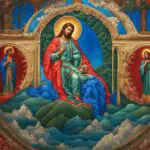Mountains have long held deep symbolic significance in the Bible, representing more than just physical formations. They carry spiritual and metaphorical meanings, reflecting the relationship between humanity and God. Let’s explore the symbolism and references to mountains in scripture.
Key Takeaways:
- Mountains in the Bible hold religious symbolism for Jewish and Christian cultures.
- They are seen as closer to God, representing His presence and covenant.
- Important mountains include Mount Sinai, Mount Zion, and Mount Carmel.
- Mountains symbolize spirituality, strength, and faith in God.
- They serve as places of worship and refuge in times of trouble.
Mountains as Symbols of Spirituality
Throughout history, people of various religions have associated mountaintops with heightened spirituality. Building temples, altars, and shrines on mountain peaks was a way for humans to draw closer to their gods. In the Bible, mountains symbolize a connection with God’s presence and serve as a place of worship. While physical proximity to God is not the purpose of mountains in God’s plan, the symbolism behind these majestic formations can deepen our understanding and faith in Him.
Mountains symbolize spirituality in their elevation above the surrounding terrain, reaching toward the heavens. Their towering presence represents a pathway to the divine, a place where heaven and earth meet. Many spiritual practices, such as meditation and prayer, take place in mountainous regions to create a conducive environment for connecting with the spiritual realm.
Mountains also provide a sense of awe and reverence, inspiring individuals to contemplate the vastness and grandeur of God’s creation. They serve as a reminder of our smallness in the face of something greater, promoting humility and a sense of wonder. In the Bible, we see individuals like Moses and Jesus ascending mountains to commune with God and receive divine guidance.
Mountains are not only physical entities but also hold symbolic value in spiritual and religious contexts. They represent the heights of spirituality, places where we can draw closer to God and experience His presence. Whether through personal reflection or communal worship, mountains serve as sacred spaces that facilitate a deeper connection with the divine.
As we appreciate the symbolism of mountains, we recognize that the true essence of spirituality lies not in physical locations but in our hearts and minds. Mountains can inspire us to seek God’s presence wherever we are and remind us that He is always near. They invite us to lift our hearts in worship and draw closer to God, regardless of our geographical surroundings.
Significant Mountains in the Old Testament
Mountains play a prominent role in the Old Testament, symbolizing various aspects of faith, covenant, and divine encounters. Let’s explore the significance of four major mountains mentioned in the Scriptures: Mount Sinai, Mount Zion, Mount Ararat, and Mount Moriah.
Mount Sinai
Mount Sinai holds immense importance as the place where Moses received the Ten Commandments from God. Located in the southern part of the Sinai Peninsula, this sacred mountain symbolizes the covenant between God and the Israelites. It serves as a reminder of the divine guidance and the moral code given to the people.
Mount Zion
Located in Jerusalem, Mount Zion is closely associated with the Jerusalem Temple and represents the spiritual center for Jewish worship. It is often used metaphorically to signify the heavenly city and the eternal dwelling place of God. Mount Zion is a symbol of divine presence and the fulfillment of God’s promises to His chosen people.
Mount Ararat
Mount Ararat holds historical significance as the mountain where Noah’s Ark is believed to have landed after the great flood. It symbolizes God’s preservation and deliverance of humanity. While the exact location of Mount Ararat is disputed, it remains an important symbol of God’s faithfulness in preserving life and starting anew.
Mount Moriah
Mount Moriah is the mountain where Abraham was tested by God to sacrifice his son, Isaac. This moment represents absolute trust and obedience to God’s command. Mount Moriah is also the site where Solomon built the first Jerusalem Temple, making it a significant mountain in the context of divine worship and sacrifice.
| Mountain | Significance |
|---|---|
| Mount Sinai | Symbolizes God’s covenant and the reception of the Ten Commandments by Moses. |
| Mount Zion | Represents the spiritual center for Jewish worship and the fulfillment of God’s promises. |
| Mount Ararat | Symbolizes God’s preservation of life and the starting point after the great flood. |
| Mount Moriah | Associated with Abraham’s test of faith and sacrifice, as well as the location of the Jerusalem Temple. |
These mountains serve as powerful reminders of God’s presence, His covenant, and His faithfulness throughout the Old Testament narrative. They provide a tangible connection to the stories of our spiritual ancestors and hold deep significance in shaping the history and faith of the Jewish and Christian traditions.
The Importance of Mount Carmel
Mount Carmel holds a significant place in biblical history, particularly due to the victory of the prophet Elijah over the false gods of Baal. This mighty mountain witnessed an extraordinary display of God’s supremacy, affirming His power and establishing the one true God as the ultimate authority.
In the book of 1 Kings, Elijah challenged the prophets of Baal to a test. They would each prepare a sacrifice and call upon their respective gods to consume it with fire. The prophets of Baal went first, but their cries and rituals went unanswered. Then it was Elijah’s turn. He built an altar, soaked it with water, and called upon the Lord. In a miraculous display of divine intervention, fire came down from heaven, consuming not only the sacrifice but also the altar itself.
“Then the fire of the Lord fell and burned up the sacrifice, the wood, the stones, and the soil, and also licked up the water in the trench.” – 1 Kings 18:38
This dramatic event on Mount Carmel demonstrated the power and supremacy of the one true God. The people witnessed the undeniable evidence of His existence and turned away from the false gods they had been following. It was a moment of repentance and reaffirmation of faith in the God of Israel.

The Victory of God’s Supremacy
Mount Carmel serves as a powerful testament to God’s supremacy and His willingness to intervene on behalf of His people. It stands as a reminder that even in the face of overwhelming odds or opposition, God’s power and authority will prevail.
| Key Details | Symbolism |
|---|---|
| Elijah’s challenge | Proclamation of God’s supremacy |
| Consuming fire | God’s divine intervention |
| Repentance of the people | Renewal of faith in God |
Mount Hermon and the Transfiguration
Mount Hermon, the tallest mountain in the region, holds great significance in the New Testament as it is believed to be the location of the Mount of Transfiguration. This significant event showcased Jesus’ deity and affirmed his divine identity to his disciples.
The Transfiguration took place on Mount Hermon, where Jesus’ glory was revealed in the presence of Peter, James, and John. The disciples witnessed a remarkable moment as Jesus’ appearance transformed, dazzling white, and Moses and Elijah appeared with him. This powerful encounter highlighted Jesus’ authority and fulfilled the prophecies from the Old Testament.
The Mount of Transfiguration serves as a pivotal event in the life of Jesus, affirming his divinity and further revealing his purpose on earth. It serves as a testament to his power and the fulfillment of the Old Covenant through him, as represented by the presence of Moses and Elijah.
The Significance of Mount Olivet
Mount Olivet, also known as the Mount of Olives, holds great significance in the life of Jesus and plays a prominent role in biblical narratives. It is situated to the east of Jerusalem, across the Kidron Valley, and is named after the olive trees that once covered its slopes. Mount Olivet is mentioned several times in the New Testament, particularly in relation to significant events in Jesus’ ministry and the fulfillment of prophecies.
One of the most notable events that took place on Mount Olivet is the Garden of Gethsemane, where Jesus went to pray before his crucifixion. It was in this garden, located at the foot of the mountain, that Jesus experienced great anguish and surrendered to the will of God. The Garden of Gethsemane serves as a powerful reminder of Jesus’ human nature and his ultimate sacrifice for the redemption of humanity.
Another significant event associated with Mount Olivet is the Ascension of Jesus. After his resurrection, Jesus appeared to his disciples multiple times, and on the fortieth day, he led them to the Mount of Olives. It was here that Jesus ascended to Heaven, promising his followers that he would return in the same way he departed. The Ascension of Jesus from Mount Olivet marks the completion of his earthly ministry and the anticipation of his second coming.
Mount Olivet holds deep spiritual and historical significance for Christians worldwide. The mountain serves as a tangible reminder of Jesus’ final days on earth, his sacrifice, and his glorious ascension. Today, it remains a place of pilgrimage and spiritual reflection, attracting believers who seek to connect with the profound events that unfolded on its slopes.
Mountains and Valleys in the Bible
Just as life has its ups and downs, the Bible uses mountains and valleys metaphorically to represent the challenges and joys of life. Mountains can symbolize obstacles, while valleys represent times of rest or joy. The Bible mentions both mountains and valleys as part of the human experience, reminding us that God is with us through the highs and lows.
In the book of Psalms, the metaphor of mountains and valleys is often used to describe the emotional and spiritual journey of individuals. Psalm 23:4 says, “Even though I walk through the valley of the shadow of death, I will fear no evil, for you are with me; your rod and your staff, they comfort me.” This verse illustrates how God’s presence brings comfort and reassurance even in the darkest times.
“The mountains and valleys of life are not random occurrences, but purposeful parts of our journey. Through the challenges and joys, God is shaping us and teaching us to trust in Him.”
The metaphor of mountains and valleys reminds us that life’s journey is not always smooth sailing. Just as we experience mountaintop moments of success and joy, we also encounter valleys of struggle and hardship. However, we can find solace in knowing that God is with us every step of the way, guiding us through the peaks and valleys of life.

| Symbolism | Meaning |
|---|---|
| Mountains | Obstacles, challenges, and spiritual heights |
| Valleys | Rest, rejuvenation, and times of joy |
| God’s Presence | Consistent presence and guidance through life’s journey |
| Metaphorical Representation | Illustrates the ebb and flow of life, teaching us to trust in God |
The mountains and valleys in the Bible serve as reminders that our lives are not meant to be devoid of challenges. Instead, they offer opportunities for growth, strength, and a deepened dependence on God. Whether we find ourselves on the mountaintop, experiencing victory and success, or in the valley, facing trials and difficulties, we can trust that God is with us, leading us through every stage of our journey.
Mountains in Symbolic Representation
In the Bible, mountains are often used symbolically to represent various qualities and characteristics. One significant symbolic representation of mountains is steadfastness. Just as mountains stand tall and firm, immovable against the elements, they symbolize the unwavering nature of God’s faithfulness. Mountains remind us that even in the face of adversity, God remains constant, trustworthy, and dependable.
Another quality associated with mountains is strength. Mountains are majestic and powerful, representing the strength and might of God. They serve as a visual reminder of His power and sovereignty over all things. Just as mountains cannot be easily moved or shaken, God’s strength is unyielding and unwavering.
Furthermore, mountains are often associated with faith. In the Bible, faith is likened to a mustard seed, which can move mountains (Matthew 17:20). This metaphorical reference emphasizes the power and significance of faith in God. Mountains symbolize the challenges and obstacles we face in life, and through faith, we can overcome them with God’s help.
“Faith moves mountains.”
Overall, mountains in symbolic representation encapsulate steadfastness, trustworthiness, strength, and faith. They serve as powerful reminders of God’s unchanging nature and His ability to guide us through life’s ups and downs. As we navigate the mountains of life, we can find comfort and encouragement in knowing that God is always with us, providing the strength and faith we need to conquer whatever challenges come our way.
| Symbolic Representation of Mountains | Associated Qualities |
|---|---|
| Steadfastness | Unwavering nature of God’s faithfulness |
| Strength | Majestic and powerful representation of God’s strength |
| Faith | The ability to overcome challenges through faith in God |

Related Quotes
“The mountains are calling, and I must go.” – John Muir
“Every mountain top is within reach if you just keep climbing.” – Barry Finlay
“Mountains know secrets we need to learn. That it might take time, it might be hard, but if you just hold on long enough, you will find the strength to rise up.” – Tyler Knott Gregson
Mountains as Government and Covenant Symbols
In the Bible, mountains are sometimes used as symbols of government and the covenant between God and His people. Two significant mountains in this context are Mount Sinai and Mount Zion.
Mount Sinai: Symbolizing the Old Covenant Law
Mount Sinai holds great significance in the Old Testament as the place where Moses received the Ten Commandments from God. It symbolizes the giving of the Old Covenant law, which established boundaries and revealed the sinful nature of God’s chosen people. The law given on Mount Sinai served as a guide for the Israelites, emphasizing the need for righteousness and obedience.
Mount Zion: Symbolizing the Spiritual and Eternal City
Mount Zion, located in Jerusalem, represents the spiritual center for Jewish worship. It is the site of the Jerusalem Temple and holds profound symbolism in the Hebrew scriptures. Mount Zion is connected to the Davidic covenant and the fulfillment of the Old Covenant through Jesus Christ in the New Testament. Hebrews 12:22 references both Mount Sinai and Mount Zion, highlighting the transition from the old covenant to the new and the establishment of an eternal kingdom.
These mountains serve as visual reminders of God’s governance and His covenant with His people. They represent the divine authority and the spiritual heritage of the Jewish and Christian traditions, grounding believers in the rich history and promises of God.
| Mountain | Symbolism |
|---|---|
| Mount Sinai | Old Covenant law, boundaries, and sinful nature |
| Mount Zion | Spiritual center, eternal city, Davidic covenant |
| Other | Additional symbolism based on specific biblical events |
These mountains play a crucial role in the biblical narrative, representing the governance and covenant relationship between God and His people. Mount Sinai symbolizes the law and the need for righteousness, while Mount Zion signifies the spiritual and eternal city tied to the fulfillment of God’s promises. Together, they exemplify the divine authority and the spiritual heritage that provide a solid foundation for believers.
Mountains as Refuge and God’s Guidance
In the Bible, mountains are often referenced as places of refuge and safety. They serve as a reminder of God’s protection and guidance in times of trouble. Psalm 121:1-2 beautifully expresses this sentiment, declaring, “I lift up my eyes to the mountains—where does my help come from? My help comes from the Lord, the Maker of heaven and earth.”
The imagery of seeking refuge in the mountains conveys the idea that when we face challenges or uncertainties in life, we can find solace in God’s presence. Just as mountains tower above the surrounding landscape, God’s strength and power are far greater than any obstacle we may encounter. When we look to Him, He becomes our refuge, providing comfort, strength, and guidance.
Throughout the Bible, we see examples of individuals finding refuge in the mountains. Noah and his family sought safety on Mount Ararat during the great flood. David found refuge from Saul’s pursuit in the mountains, where he penned many of the Psalms. Elijah retreated to the mountains to find solace and hear God’s voice. These stories remind us that God is with us in turbulent times, offering shelter and reassurance.
| Examples of Mountains as Places of Refuge in the Bible | Scripture Reference |
|---|---|
| Mt. Ararat | Genesis 8:4 |
| Mountains of Judah | 1 Samuel 23:14 |
| Horeb (Mount Sinai) | 1 Kings 19:8 |
“The Lord is my rock, my fortress and my deliverer; my God is my rock, in whom I take refuge, my shield and the horn of my salvation, my stronghold.” – Psalm 18:2
As we navigate life’s challenges, let us turn to the mountains as a visual reminder of God’s steadfast presence and unwavering love. Just as the mountains stand tall and unmovable, so too is our God, who is our refuge and guide. May we find comfort in knowing that He is always with us, leading us through the peaks and valleys of life.

The Promises of God Overcoming Mountains
When facing mountains in life, we can find hope and strength in the promises of God. He has a plan for each of us, to prosper and not to harm us, to give us hope and a future (Jeremiah 29:11). Just as He led the Israelites through the wilderness and brought them to the Promised Land, He is faithful to guide us through our own challenges and obstacles.
God’s faithfulness is unwavering, and He has the power to overcome any mountain that stands in our way. When we place our trust in Him, He paves the way for us, opening doors, providing solutions, and giving us the strength to persevere. The mountains we face may seem insurmountable, but with God by our side, we can be confident that nothing is impossible.
“Trust in the Lord with all your heart and lean not on your own understanding; in all your ways submit to him, and he will make your paths straight.” – Proverbs 3:5-6
As we navigate the ups and downs of life, it is important to remember that God’s faithfulness extends beyond our circumstances. He is with us every step of the way, guiding us, strengthening us, and making a way where there seems to be no way. Even when we can’t see the path ahead, we can trust that God is working behind the scenes, preparing miracles and breakthroughs that we cannot yet fathom.
So, when faced with daunting mountains, let us hold on to the promises of God, knowing that He is faithful to overcome. He is the God who moves mountains, who makes a way in the wilderness and streams in the wasteland (Isaiah 43:19). Let us anchor our trust in Him, for He is the ultimate conqueror of all obstacles, and His faithfulness will carry us to victory.
| God’s Promises | Scripture Reference |
|---|---|
| Paving the way over mountains | Jeremiah 29:11 |
| Trust in the Lord | Proverbs 3:5-6 |
| Making a way in the wilderness | Isaiah 43:19 |

Conclusion
The significance of mountains in the Bible is profound, representing a range of religious symbolism and spiritual meaning. Mentioned over 500 times, mountains serve as a visual reminder of God’s presence, faithfulness, and covenant with His people. They symbolize the connection between humanity and the divine, drawing individuals closer to God through worship and reflection.
Mountains in the Old Testament hold great significance, such as Mount Sinai and Mount Zion, which represent God’s covenant with Israel and the spiritual center for Jewish worship, respectively. Mount Carmel witnessed the victorious display of God’s power over false gods, leading to repentance and reaffirmation of faith. Mount Hermon, the location of the Transfiguration, affirmed Jesus’ deity as the fulfillment of the Old Covenant.
Mount Olivet played a significant role in the life of Jesus, being the place of His crucifixion and ascension. Mountains and valleys, metaphorically representing life’s challenges and joys, remind us of God’s constant presence through the highs and lows. Mountains symbolize qualities such as steadfastness, trustworthiness, and strength, reflecting the unchanging character of God.
As we navigate the mountains of life, we can find comfort and guidance in the promises of God. Just as He led the Israelites through the wilderness to the Promised Land, He continues to pave the way for us, offering hope, prosperity, and a future. Mountains in the Bible serve as powerful reminders of God’s love and faithfulness, encouraging us to seek Him in all aspects of our lives.
FAQ
What is the significance of mountains in the Bible?
Mountains hold deep symbolic significance in the Bible, representing God’s presence, His faithfulness, and His covenant with His people.
How are mountains symbolized in the Bible?
Mountains in the Bible symbolize qualities such as steadfastness, trustworthiness, immovability, strength, and faith, which are associated with the nature of God.
Are there specific mountains mentioned in the Old Testament?
Yes, the Bible mentions several significant mountains in the Old Testament, including Mount Sinai, Mount Zion, Mount Ararat, and Mount Moriah.
What is the importance of Mount Carmel?
Mount Carmel is where the prophet Elijah proved the supremacy of the one true God over the false prophets of Baal, demonstrating God’s power and leading to the people’s repentance and reaffirmation of their faith in Him.
Is there a connection between Mount Hermon and the Transfiguration?
Mount Hermon is believed to be the location of the Mount of Transfiguration in the New Testament, where Jesus’ glory was revealed to Peter, James, and John, affirming His deity and fulfilling the Old Covenant through Him.
What is the significance of Mount Olivet?
Mount Olivet, also known as the Mount of Olives, played a significant role in the life of Jesus. It was where He prayed in the Garden of Gethsemane before His crucifixion and where He ascended to Heaven after His resurrection, promising to return in the same way.
How do mountains and valleys relate to the human experience in the Bible?
Mountains and valleys are metaphorically used in the Bible to represent the challenges and joys of life. Mountains symbolize obstacles, while valleys represent times of rest or joy, reminding us that God is with us through the highs and lows.
Do mountains serve as symbols of government and the covenant in the Bible?
Yes, Mount Sinai represents the Old Covenant law, while Mount Zion represents the spiritual and eternal city tied to the Davidic covenant and the fulfillment of the Old Covenant through Jesus Christ.
What role do mountains play as places of refuge and safety?
Mountains are often referenced in the Bible as places of refuge, serving as reminders of God’s protection and guidance in times of trouble.
Can we trust in God’s promises to overcome our mountains?
Yes, when facing mountains in life, we can trust in God’s promises to pave the way for us. He is faithful and has plans to prosper us and give us hope and a future.







